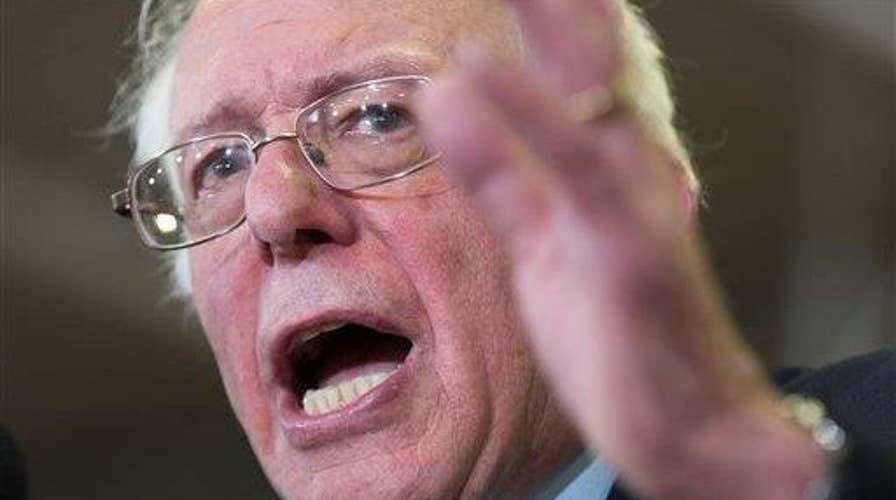Sanders supporters blast role 'superdelegates' play
Claim insiders give Clinton a big advantage
Hillary Clinton may claim she’s not part of the ‘establishment,’ but it’s party insiders who are giving her a substantial and early edge in the Democratic nomination battle – even after Bernie Sanders walloped her campaign in last week’s New Hampshire primary.
Thanks to the intricacies of the Democratic primary system, Clinton already has hundreds of so-called “superdelegates” in her corner. These are Democratic governors, lawmakers and other officials and party members who can back any candidate they want – and their vote counts at the convention just like delegates allocated based on the results of primaries and caucuses.
A reminder: It takes 2,382 delegates to win the nomination. With superdelegates alone, according to an Associated Press tally, Clinton starts out with 361 in her corner.
Clinton’s superdelegate edge created a peculiar situation in New Hampshire, and one that angered Sanders supporters. Though Sanders beat Clinton by 22 points, they both walked away with the same number of delegates – 15 apiece. The difference is, all of Sanders’ delegates were earned from his win. Clinton only won nine such “pledged” delegates – the other six were superdelegates who independently back her bid.
The outcome led to protests from progressive groups.
Online petitions from MoveOn.org and DIY RootsAction are drawing tens of thousands of signatures asking superdelegates to honor their constituents and support the candidate the people have voted for.
“Commit to honoring the voters -- let everyone know that you won’t allow your vote to defeat our votes. Announce that in the event of a close race, you’ll align yourself with regular voters -- not party elites,” says the petition at MoveOn.org.
For those who closely followed Clinton’s run against then-Sen. Barack Obama in 2008, it’s déjà vu all over again.
But as in 2008, the superdelegate support is fluid.
Though Sanders’ backers may cry foul that superdelegates are siding with the former secretary of state early, elections experts told FoxNews.com these party insiders could very well change their minds before the convention.
“The rules give [superdelegates] the latitude; they are unpledged delegates, they can go back and forth as much as they want to,” said Josh Putnam, a lecturer at the University of Georgia who runs the popular elections blog, FrontloadingHQ.
Clinton, for now, enjoys an edge going into most upcoming contests.
According to the AP tally, Clinton goes into this weekend’s Nevada caucuses with three superdelegates and into the upcoming South Carolina primary with two. She has 83 superdelegates in her corner going into Super Tuesday March 1.
As early as August, Clinton’s people were boasting they had secured as many as 440 unpledged delegates -- the Associated Press has confirmed she has 361 out of 712 so far.
Superdelegates will make up 15 percent of the total delegate count at the Democratic National Convention. That total is actually down from 2008 when superdelegates constituted 20 percent and the same questions were raised during the primary battle between then-Sen. Barack Obama and Clinton.
Putnam said the superdelegates were instituted by the party in the early 1980’s in response to Democrats’ concern that the predominance of pledged delegates – those tied to votes – was leading to the grassroots-driven nomination of unelectable candidates. This followed the unsuccessful campaign of George McGovern in 1972 and Jimmy Carter’s one-term presidency after that.
“They felt the need to give the party a bit more say in that to make sure someone more electable would emerge, if need be,” he said. “It’s a backstop, more or less.”
On the other hand, the Republican Party has superdelegates, too, but in 2012 the party changed the rules to bind all delegates based on the outcome of presidential primaries and caucuses.
Clinton loyalist and former Pennsylvania Gov. Ed Rendell defended the system, suggesting the 361 superdelegates are backing Clinton because they believe Sanders is unelectable.
"I think because of the superdelegates who cast their vote based on electability have serious doubts whether Bernie Sanders could be electable once the GOP starts campaigning against him and putting ads against him,” he told NBC News.
When told there was a mini-uproar over the prospect of Clinton walking away with the same amount of delegates after Sanders “crushed her” in New Hampshire, Rendell said simply: “It's the same system that nominated Barack Obama.”
There is the rub, said Daniel Smith, politics professor at University of Florida. By the time the convention opened in 2008, Obama was winning primaries and had captured all undecided superdelegates and defectors from Clinton.
In other words, it didn’t matter that she had been scooping up superdelegates early in that race.
In this case, it could end up hurting her anyway.
“Having superdelegates in the bag doesn’t necessarily help Clinton’s optics for shaking up D.C.," Smith said. “Certainly it’s important, but it can be flipped around. Here is an establishment candidate and she has the supporters, but is she really listening to the folks on the ground? This is something Bernie Sanders can exploit.”






















